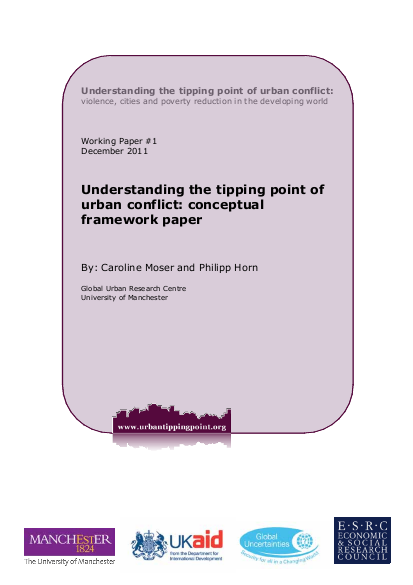
This conceptual paper provides a background document for the research project on ‘Understanding the Tipping Points of Urban Conflict’ (UTP). Its objective is twofold: first, to briefly outline the objectives of the project; and second, to elaborate on the conceptual framework underpinning the research. The project is grounded in recent debates relating to conflict and violence, arguing that while cities are inherently conflictual spaces, this conflict is generally managed more or less peacefully through a range of social, cultural and political mechanisms. At the same time the reasons as to why and when conflict tips over into chronic, generalised or overt violence in some cities and not in others are poorly understood. Globally increasing levels of violence in cities, whether based on endemic gang, crime or drug-related violence, gender-based attacks, ethnic strife, terrorism, or outright warfare, make this a critical issue to consider, particularly as it is widely recognised that violence has implications not only for country and metropolitan level economic development, but also for the livelihoods and well-being of those poor households and communities who are often at the frontline of urban conflict. Preventing and reducing violence is therefore a key priority to be taken into account in designing poverty reduction initiatives and social protection measures for the poor.
Resource collections
- UN Habitat - Urban Response Collection
- Urban Response - Urban Crisis Preparedness and Risk Reduction
- Urban Response Collection - Community Engagement and Social Cohesion
- Urban Response Collection - Economic Recovery
- Urban Response Collection - Environment and Climate Change
- Urban Response Collection - Housing, Land and Property
- Urban Response Collection - Urban Crisis Response, Recovery and Reconstruction
- Urban Response Collection - Urban Resilience